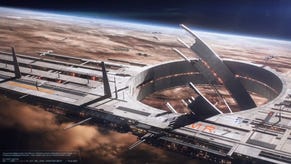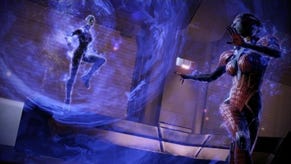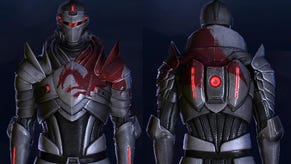The Top 25 RPGs of All Time #15: Mass Effect
Commander Shepard begins their legendary journey right here.
This article first appeared on USgamer, a partner publication of VG247. Some content, such as this article, has been migrated to VG247 for posterity after USgamer's closure - but it has not been edited or further vetted by the VG247 team.
We're counting down the 25 best RPGs ever on USG! Go here to see previous entries, and also make sure to subscribe to Axe of the Blood God for the accompanying podcast segments!
I was a late convert to the church of Bioware, given the studio's long history. I owned a PC and I knew of Baldur's Gate, Icewind Dale, and Neverwinter Nights, but I never picked them up. I didn't get into the computer role-playing game (CRPG) genre until after Bioware's console entries.
Bioware's Star Wars: Knights of the Old Republic for the original Xbox was a watershed moment for me. I was onboard immediately as a long-time Star Wars fan and simply jumped at the chance to finally be a Jedi. The studio followed that title with Jade Empire, and as a lover of classic Shaw Brothers and Jackie Chan films, I was ready. Bioware and the Xbox were a key part of a change in the gaming industry, showing fans, developers, and publishers that PC games could work on consoles. It also brought a host of fans like myself over to some classic PC RPGs.
Buoyed by the success of Knights of the Old Republic, Bioware decided to make its next title for consoles as well. The team behind KOTOR took the expertise gained on the Xbox and used that to kickstart development of their project for its successor, the Xbox 360. It was Bioware's largest project at the time, with significant work spent on building out Unreal Engine 3, a development team of over 130 people, and a story that was planned to span an entire trilogy. If Knights of the Old Republic and Jade Empire were the first steps, this was the game that represented Bioware breaking out into a full-on sprint.
That game was Mass Effect.
Mass Effect was Bioware's moment to cement itself as prestige studio for console players. The developer crafted a brand-new universe for players to explore; part-Star Wars, part-Star Trek, part-Starship Troopers. The cinematic presentation was heavily improved over Bioware's previous offerings. The turn-based combat of Knights of the Old Republic was shifted towards an interface that resembled a third-person shooter; players retained the ability to pause combat, but a cover system was introduced and the camera was over your character's shoulder, as opposed to the more free-form camera of previous games.
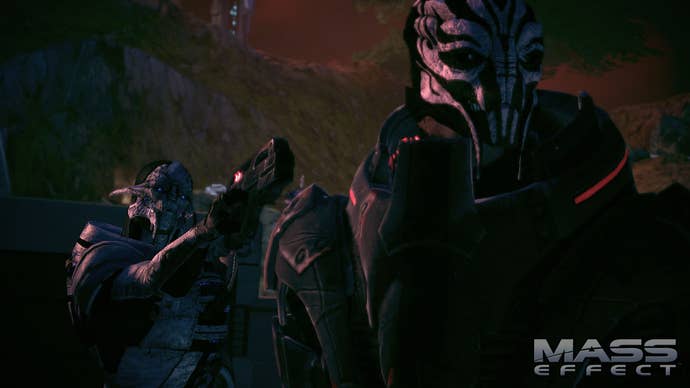
From the opening moments, it was clear Bioware had improved on every facet over its previous games. Mass Effect begins with a view of the Earth from space, with a conversation between Captain David Anderson and human diplomat Donnel Udina, two characters who would later act as physical manifestations of your moral compass. The camera pans back to show your version of Commander Shepard looking down at the Earth, as if to say, "This game is already bigger than you can imagine." That's followed with the building synths of the soundtrack—a callback to science fiction film soundtracks from the 80s—and the title card. Mass Effect is all about atmosphere, making the player feel like this is a playable movie.
This jumps to the player walking the deck of the Normandy, the ship that will become your hub and home for the rest of the game. The ship speeds past Jupiter, before using a mass relay to teleport. Mass Effect's presentation of scope and scale simply outstripped many other RPGs at the time. Hell, it outstripped many games at the time period, becoming a flagship title for the Xbox 360.
After your first mission on Eden Prime, players are sent to the Citadel, the center of the galaxies commerce and politics. This fantastic futuristic space station was the introduction to the game's races: Turian, Asari, Elcor, Hanar, Volus, and more. Years of watching shows like Star Trek: Deep Space Nine and Babylon 5 presented audiences with these vast cities full of alien life; Mass Effect was the first game where you really felt like you had stepped into one yourself. The districts of the Citadel are unique, from the wealthy Presidium to the underclass of the Wards. The writing team, led by Knights of the Old Republic writer Drew Karpyshyn, made each alien race feel unique and distinct, while also showing how they fit into the patchwork of the Citadel.
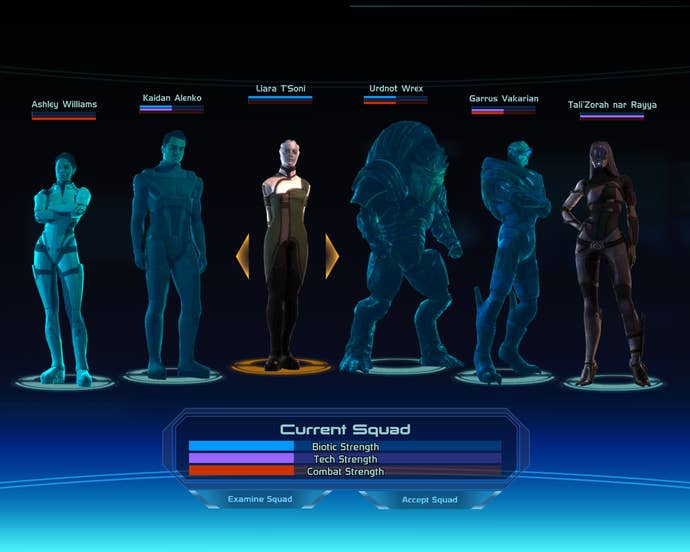
But the core of Mass Effect's appeal was similar to its predecessors: the characters and their stories. Commander Shepard's squad included Ashley Williams, Kaidan Alenko, Garrus Vakarian, Liara T'Soni, Tali'Zorah nar Rayya, and Urdnot Wrex. Each member is fully-voiced—Mass Effect featured some excellent voice acting—and approaches your overall mission from different viewpoints. Ashley is a pro-human soldier who has to learn to work with aliens. Liara is a member of the feminine Asari, a mostly-peaceful archeologist with a connection to those who want to destroy the galaxy. Or there's Wrex, a gruff Krogan, one of the most fearsome races in the galaxy, now made sterile by a disease created by the reigning government.
Mass Effect gives you the chance to get to know the entire cast. You can wander the Normandy and talk with them, probing as shallowly or deeply as you desire. If you push, you'll find out that Garrus once ordered the deaths of several people to catch one fugitive, but he still doesn't realize the mistake he made. Dig deeper with Kaidan and you'll find he was one of the early experimental Biotics, humans exposed to element zero to give them control over dark energy and supernatural abilities. Like previous Bioware games, you can even romance some of your squad mates, leading to the sex scenes that were quite controversial at the time, though they now feel quite chaste.
Mass Effect was a game where you could share water-cooler conversations with your friends, because the choices you made felt important. Was your Shepard a violent Renegade, like Saren, the Spectre you were chasing on your galaxy-spanning adventure, or a virtuous Paragon, standing for everything Spectres and humanity should be? Did you choose to destroy the Rachni Queen, committing an entire race to extinction because of actions outside of its control? On the planet Virmire, your team is presented with the cure to the genetic disease making the Krogan sterile. When you have to destroy the cure, you're given the option to talk Wrex down from mutiny—this is the fate of his race on the line—or outright kill him. Mass Effect offered players choices that aren't outright "correct". It's one thing to be given the choice to kill or pet the puppy. It's another to be confronted with choices that make you question your own morals and ethics.
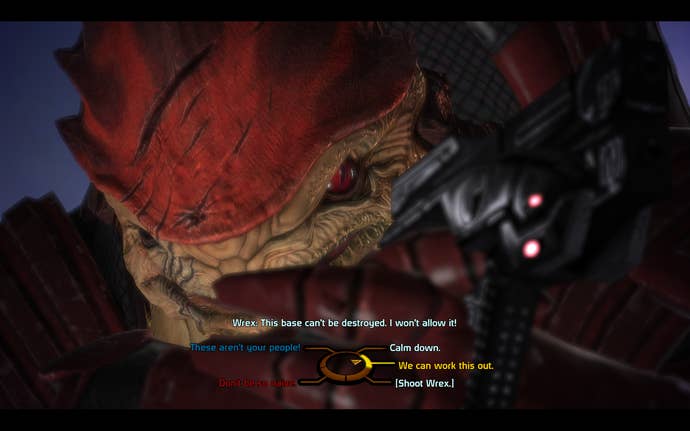
The first Mass Effect was also an explorer's paradise in a way that sequels were not. There's that moment where you're given full command on the Normandy to hunt down Saren and his comrades. You step in front of the Galaxy Map and you're confronted with all the places you can go. Countless planets to explore. You can just float around the galaxy if you want, scanning planets and riding across their surfaces in the Mako, your mobile land buggy. Sure, many of the planets were barren and lifeless, but some had secrets to find, whether it's resources, outposts, or new alien life. Again, Mass Effect was all about the atmosphere; cruising around the galaxy gave the player the feeling that they were really exploring things like Captain Kirk on the Enterprise.
Mass Effect 2 is a better "game" in my opinion, but it was the beginning of Bioware losing some of its more interesting rough edges. The first Mass Effect has jank and bugs. The performances are wooden by today's standards and the character stories are more interesting in Mass Effect 2. For all the talk of exploration, the maps actually end up being fairly linear. The Mako controls like an ugly boat on wheels. But at the time, everything Bioware put into Mass Effect came together in this incredible science fiction experience, a moment in time matched only by other legendary classics like Halo.
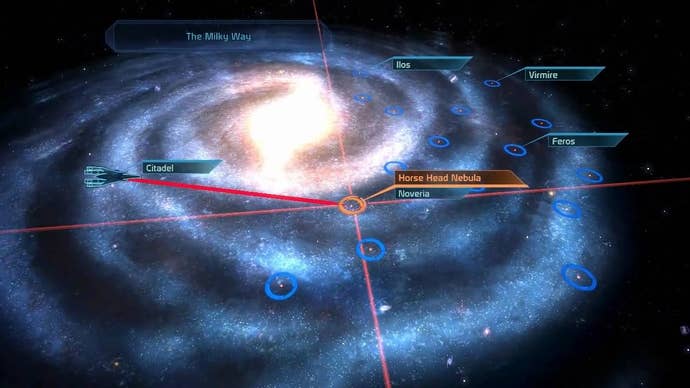
Towards the end of the game, you're facing off against Saren, the alien you've been chasing for the past 30 hours. At this point, he's a husk, a puppet controlled by the Reaper Sovereign. And you're given the chance to talk him down, to convince him to be the good soldier he once was and kill himself for the greater good. It's amazing moment, something that I hadn't experienced in a video game yet. The same was true for many other players at the time, because we hadn't played Fallout or Planescape: Torment. Mass Effect was our entry into this style of storytelling. It was the chance for Bioware to show an audience, "This is what games can do."
And that's why Mass Effect remains one of the best RPGs on all-time.






